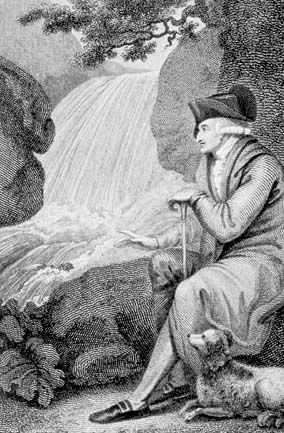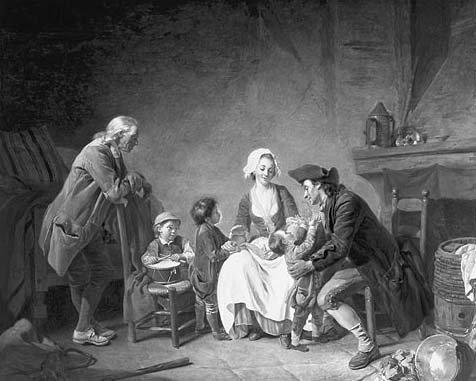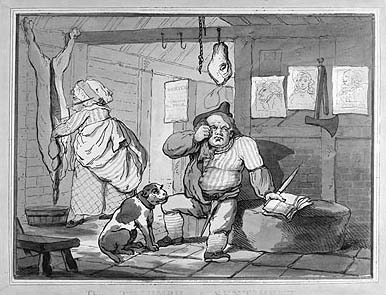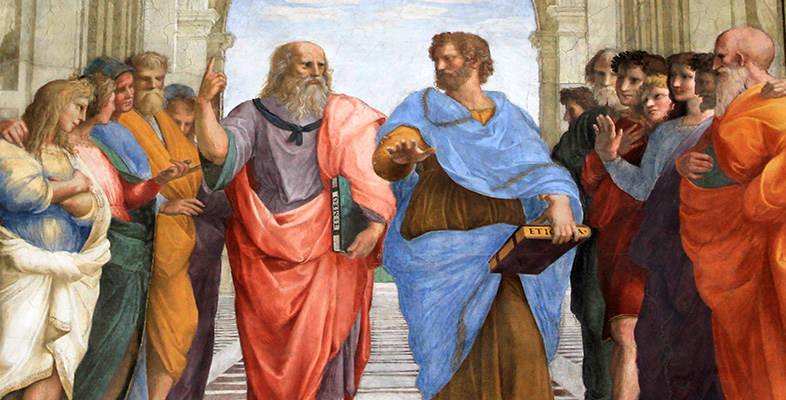8.2 The increasing status of feeling
Although the Enlightenment advocated the rigorous use of reason as the main means of achieving progress, some of its major thinkers also recognised the role of feeling or emotion, particularly in moral matters. Chief among these was Rousseau. He felt that ‘inner sentiment’ played an important part in matters of conscience and of religious faith, as well as in human relations. By ‘sentiment’ he meant everything embracing intuition (a word rarely used in the eighteenth century) and emotion except extreme emotion, which was normally referred to as ‘passion’. As his career developed, Rousseau became obsessive about sentiment. He had begun, like the rest of the philosophes, as a model rationalist, contributing articles on music to the Encyclopédie and writing works such as Entile that focused on a reasoned analysis of society's defects and proposed rational solutions. As a result of various quarrels, temperamental difficulties and growing paranoia, he increasingly saw himself as the enemy of other Enlightenment thinkers, whose excessive reliance on reason alone had, he believed, led them astray. If only they listened to their heart and conscience as much as to their reason, he believed, they would see things his way. In his best-selling La Nouvelle Heloise (1761) he wrote of the infallible promptings of individual conscience: ‘Whatever I feel to be right, is right. Whatever I feel to be wrong, is wrong’ (Hampson, 1968, p. 195).
To Hume, Rousseau's ‘sensibility’ (propensity for feeling) impeded rather than assisted his common sense. It threatened the processes of sound, empirical reasoning in the formulation of his views on religion and morality, and it seemed inappropriate to use sentiment as a means of establishing facts. Rousseau advocated a natural religion based on ‘feeling’ God's power and goodness through the contemplation of nature, in addition to deploying some of the more conventional arguments of rational deism (see Figure 10).
Rousseau's emphasis on sentiment led, in his later career, to a period of intense introspection explored through his autobiographical Confessions (which he read informally to friends in 1771), Reveries of the Solitary Walker (on which he worked between 1776 and 1778, the year of his death) and Rousseau, Judge of Jean Jacques (completed in 1776), all of which were published posthumously. In these works he attempted to justify himself to those with whom he had quarrelled, to set the record straight, as he saw it. In the Reveries he described solitary walks in which he meditated on nature, and experienced by the lapping water of a lakeshore the delicious sensation of pure existence, while pouring scorn on his enemies, the philosophes, whom he increasingly classified as dogmatists. He indulged to an unprecedented degree in self-absorption, in an avowed conviction of and a delight in the consciousness of his own uniqueness, in posing and in answering the question: ‘what am I myself?’ (Furst, 1979, p. 57). In the Confessions too he begins with the same fascination with self:
I am undertaking a work which is wholly without precedent … I wish to show my fellow-men a man in all his natural truth, and I myself will be that man. Myself alone. I feel my heart, and I know men. I am not made like any of those whom I have seen. I venture to believe that I am not made like any other men who exist. If I am no better than they, at least I am different.
(Rousseau, 1847, p. 25; trans. Lentin)
The Confessions are written in a way that suggests openness and sincerity with what appears to be a ruthless and unforgiving exposure of his own faults, disappointments in love and sexual obsessions. In fact, they construct very carefully the persona with which he wishes to be identified: ardent but just. In contrast with the mainstream Enlightenment (say, with Johnson's reflections, implicitly based on a view of man as a social creature, a thinking member of rational society), Rousseau's prime concern is with himself as an individual and the uniqueness of his identity in a society with which he finds himself at odds.

Rousseau was not the first writer to engage in deep self-reflection or to be inspired by strong feeling. However, the nature and timing of Rousseau's writings had a profound impact on an eighteenth-century readership beginning to tire of pure reason and eager to explore aspects of their own identities. A conscious tinge of emotionalism counteracted Augustan common sense and the noonday clarity of the Encydopédie. Poems such as Young's Night Thoughts (1742) and Thomas Gray's Elegy written in a Country Churchyard (1742–51) set a fashion for melancholic verse set in ‘gothic’ surroundings, typically a moonlit graveyard. Such verse foregrounded the emotion of the narrator's voice as he reflected on the inevitability of death, allowing his imagination freer range by relating to the evocative environment, the poet communing with himself and his own thoughts. Night settings were to become an important source of inspiration for Romantic writers, musicians and artists. In England the best-selling novels of Samuel Richardson (1689–1761), Pamela or Virtue Rewarded (1740) and Clarissa (1747–8), told deeply emotional tales, detailing the subjective reactions of innocent women deceived by rakes, and were very influential for later Enlightenment writers such as Diderot. For these writers the aim was to stir the readers’ emotions to the core, to the point of making them weep. From the 1760s onwards there was throughout Europe a cult of intense sensibility inspired in great part by figures such as Richardson and Rousseau. Rousseau's La Nouvelle Heloise, which ran to 70 editions in France by 1789, told the story of two lovers torn between their love and duty to a third member of a love triangle. Translated into many languages, the novel inspired writers well into the nineteenth century.
Summary point: in the second half of the eighteenth century, a growing number of writers, artists and thinkers, many inspired by Rousseau, became preoccupied with the expression of emotions. Self-absorption and a concern with one's unique identity became more central.
This was paralleled in the emotionalism of the Olney Hymns, in which the Evangelicals Newton and Cowper sought to move their congregation with a sense that open-hearted receptivity to Christ's sacrifice and redeeming love could purge and revolutionise their own lives. The purpose and indeed the effect of the Evangelical mission within the Anglican Church was literally to move and stir the suppliant: to induce tears, fainting, speaking in tongues, profound emotional disturbance and spiritual regeneration. Religious ‘enthusiasm’ – the conviction of direct personal communion with God, a personal zeal for Christ, empathy with his sacrifice on the cross (a quality discouraged by traditional Anglicans and deplored by Dr Johnson as akin to fanaticism) – was the motive force of Evangelicalism. The rapid growth in our period of Methodism, originally a variant of, and then an alternative to, Anglicanism, also intensified emotional worship. Of John Wesley (1703–91), the founder of Methodism, it has been said: ‘No single eighteenth-century figure influenced so many minds’ (Dorn, 1940, p. 241). His preaching began in the 1730s, and therefore constituted one of the earlier stimuli to the cult of feeling. Wesley had experienced, preached and encouraged the soul-shaking emotionalism associated with conversion, in reaction to the worldly and tepid decorum approved by the mainstream Anglican Church. There were many manifestations of such emotionalism outside the context of religion. Sentimental (in the sense of ‘full of sentiment’) plays became popular at the theatre, and weeping in the galleries was taken as a sign of an audience's healthy moral conscience. This new emphasis on feeling in art and literature (see Figure 11) may have been, in part, a result of the increasing secularisation of the life of many of the privileged and educated; emotional fulfilment from art and literature was perhaps particularly important to those who felt that religion no longer answered their needs.

As an art critic, Diderot was among those who encouraged artists to paint emotive, moral anecdotes calculated to make the virtuous shed tears. Like many others, he argued that all good people would weep at the same misfortunes and would draw universal lessons from highly personal responses. This unprecedented emphasis on emotion drew greater attention to the personal responses of the individual, one of the central concerns of an emergent Romanticism.
In Germany from the 1770s there was a similar shift towards emotion in the form of the Sturm und Drang movement, normally translated as ‘storm and stress’. The ‘stress’ was a form of reaching or striving forward that embraced a creative rebellion against convention in the cause of freedom, whether artistic, emotional or even political. Friedrich Schiller's The Robbers (1781) is a play about idealistic, self-assertive young anarchists who emulate Robin Hood. Their leader, the ‘hero’, Karl Moor, takes revenge on a hateful hide-bound society by committing a series of atrocious murders. He denounces authority in heady language:
The law has never yet formed a great man. It is freedom that has bred colossuses … Put me in charge of a band of men like me, and I will make of Germany a republic beside which Rome and Sparta will seem like nunneries.
(Sorel, 1912, p. 162; trans. Lentin)
The unprecedented appeal of ‘storm and stress’ is shown by the reception of The Robbers on the opening night, which, as the commentator observed, marked a crucial literary and psychological threshold:
The theatre was like a lunatic asylum, with rolling eyes, clenched fists, hoarse uproar among the audience. Strangers fell sobbing into each other's arms, women tottered, half-fainting, to the door. It was a universal disruption into chaos, out of whose mists a new creation is emerging.
(Hampson, 1968, pp. 201–2)
The movement also emphasised the eccentricities of individual character, as opposed to the Enlightenment's focus on a universal human nature. The outlook projected by Sturm und Drang was that of the alienated outsider, the socially excluded, the outlaw. Alienation, self-expression and the sublime were also prominent in an early novel by Goethe, The Sorrows of Young Werther (1774). This novel, one of the most popular of the late eighteenth century, was close in its plot and tone to Rousseau's La Nouvelle Heloise, but pushed the despair of impossible love to even more tragic extremes (see Figure 12). Life followed art when young men imitated Werther not only in the clothes they wore, but even to the point of committing suicide. Among the thousands of adolescent readers of Werther harbouring dark thoughts was a lonely 16-year-old officer cadet from Corsica training at the royal military academy at Paris, Napoleon Bonaparte.

Rousseau's new emphasis on sensibility or feeling stimulated an interest in forces that posed a threat to the centrality of Enlightenment reason. Equally, his view of nature as a site of meditation and spiritual contemplation challenged the pre-eminence of nature as something to be categorised, controlled and exploited. Nothing could be further from the Augustan common sense and sociability of Johnson, a city dweller addressing other city dwellers in his observations on the Highlands, than the introspective, fanciful and self-indulgent reflections typical of Rousseau's ‘sensibility’. Yet for the generations that grew up on Rousseau, nothing was more attractive:
Emerging from a long and happy reverie, seeing myself surrounded by greenery, flowers and birds, and letting my eyes wander over the picturesque far-off shores which enclosed a vast stretch of crystalline water, I fused my imaginings with these charming sights, and finding myself in the end gradually brought back to myself and my surroundings, I could not draw a line between fiction and reality; so much did everything conspire equally to make me love the contemplative and solitary life I led in that beautiful place.
(Reveries of the Solitary Walker, ‘Fifth Walk’, 1782, in Rousseau, 1979, pp. 90–1)
For Rousseau nature was a part of, rather than separate from, his own thoughts, feelings and imaginings. This attitude, together with his emphasis on personal feeling, exerted a powerful influence on the Romantics.
